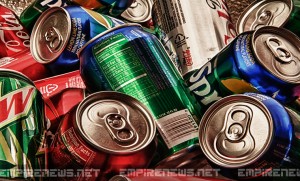There’s nothing worse than a “flat” soda, but according to experts from California’s Stanford Woods Institute for the Environment, the familiar hiss of a can or bottle when opened translates into increased depletion of the Earth’s protective ozone layer. Holes in the ozone layer mean more exposure to ultraviolet light, which translates into increased risk of sunburn, skin cancer, and heat stroke related injuries.
“Over 2 billion cans and bottles of carbonated beverages are opened worldwide each day, exposing us all to dangerous levels of exposure to ultraviolet light,” says atmospheric expert Dr. Althea Thoone. “It’s fascinating that a simple, everyday act can have such a negative wide-ranging impact; however, small changes in our daily activity will help lessen the danger.”
Thoone’s groundbreaking study is the result of more than five-year’s analysis of university based surveys. The professor chose a university-based population because of the high number of carbonated beverages consumed, as compared against the national average. College and university populations consume carbonated beverages up to seven times greater than the national average.
Besides the environmental hazards, health effects of carbonated beverages – which can contain as much as 12 teaspoons of sugar in a 12-ounce serving – can be measured in increased rates of diabetes, hypertension, and heart disease.
“Obviously fewer cases of heart disease, diabetes and skin cancer mean good news for everyone,” added Thoone. “We must also take into account the negative effects of carbon dioxide released when you burp. Multiply the effects of human digestion by 3 billion, and then apply that to the environment, and you’ve got a huge issue, similar to that of the methane problem we have caused by farting cows.”
Soft drink container recycling also negatively contributes to the thinning of the Earth’s protective layer. Fossil fuels used to transport cans and bottles to recycling plants, not to mention the operation of the plants themselves, produce a domino effect. “If we can reduce our intake of carbonated soft drinks by 10 percent,” says Thoone, “the long range benefits for our planet will be immeasurable, in a good way. Unless we cut back on our consumption, we’re headed for a catastrophe.”
No word yet from soft drink manufacturers who will undoubtedly disagree with reduced soft drink consumption, but for now, you may want keep the sunscreen handy the next time you “pop that top.”





























